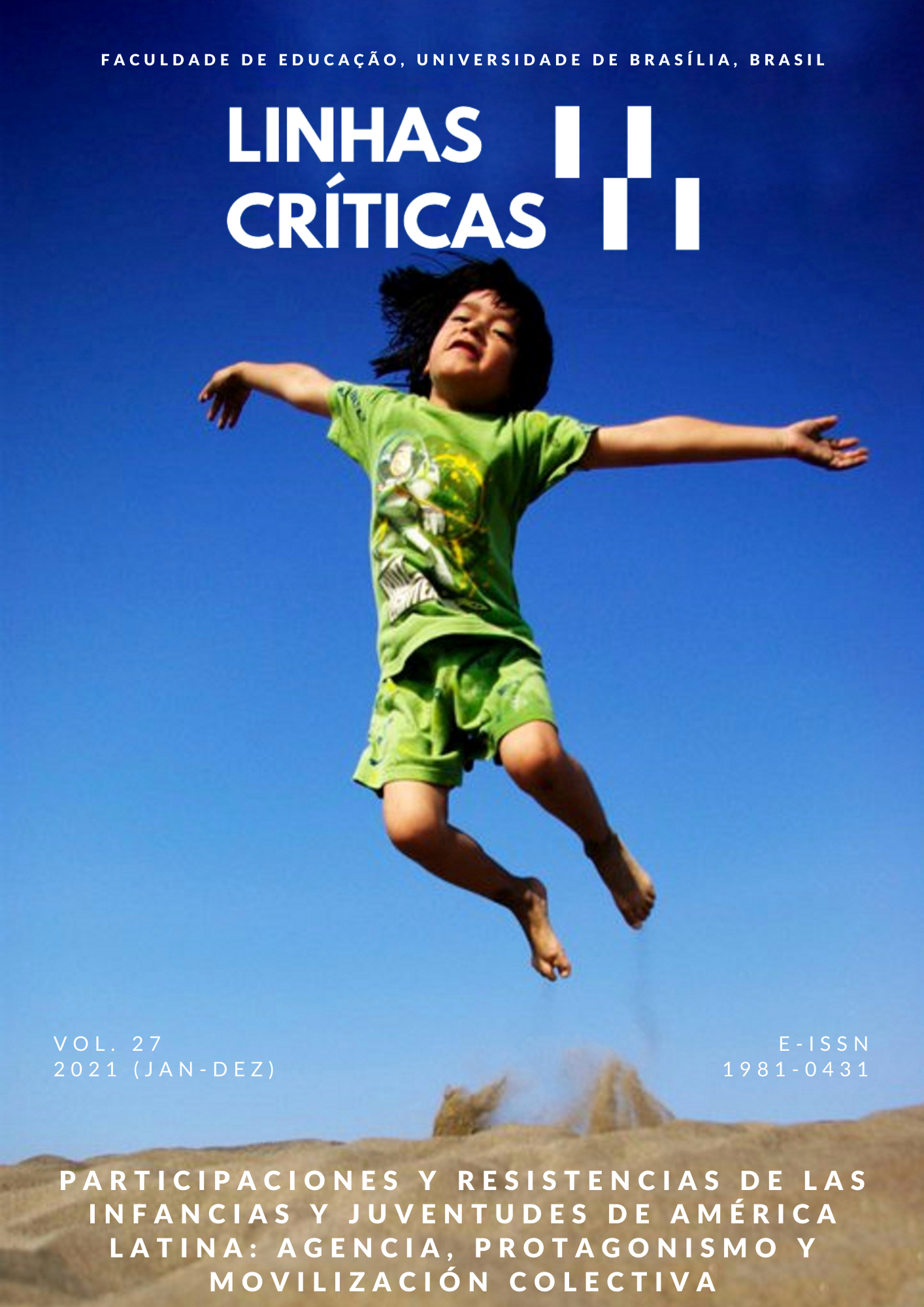From the phármakon effect to the reinvention of child subjectivities in cyberculture
DOI:
https://doi.org/10.26512/lc.v27.2021.35058Keywords:
Phármakon effect, Technological experience, Subjectivities, Childhoods, Agency capacityAbstract
This text discusses how the experience of the chilhood self is transformed through current technicalities as well as the processes of subjectivation of peasant, Afro-Colombian, mestizo and indigenous girls and boys from Bogotá-Colombia in differential contexts of ethnicity and gender. According to the doctoral research Childhoods, technicalities and narrativities, one of the results arises that their processes of participation in the dominant communicative ecosystem go through a double effect of phármakon poison/remedy, which widens gaps in which other faces of colonialism are imposed, and therefore it challenges us to recognize its capacity for agency in the face of creative modes of subjective reinvention.
Downloads
References
Badiou, A. (2017). La Verdadera Vida. Un mensaje a los jóvenes (Traducción de Víctor Goldstein). Interzona.
Bauman, Z. (2013). La cultura en la modernidad líquida. Fondo de Cultura Económica.
Corea, C., & Lewkowicz, I. (2004). Pedagogía del aburrido. Escuelas destituidas y familias perplejas. Paidós.
De Kerckhove, D. (1997). La Piel de la cultura. Investigando la nueva realidad electrónica. Gedisa.
Deleuze, G., & Guattari, F. (2004). Mil Mesetas, capitalismo y esquizofrenia (Sexta edición). Pre-textos.
Esperança, J. A., & Ribeiro, P. C. (2014). Medios de comunicación y consumo en las voces de los niños: la producción de los cuerpos infantiles. Linhas Críticas 20(41), 189-208. https://doi.org/10.26512/lc.v20i41.4269
Gómez, R. (2010). Procurarse sentido en la ciudad contemporánea: jóvenes y nuevos repertorios tecnológicos. [Tesis Doctoral. Universidad Pedagógica Nacional].
González, J. (2007). De la cultura(s) a la cibercultur@(s). Incursiones y otros derroteros no lineales. Universidad Nacional de La Plata y UNAM. https://www.academia.edu/1761474/De_la_cultura_a_la_cibercultur_at_Incursiones_y_otros_derroteros_no_lineales
González, J. (2008). Digitalizados por decreto: cibercultur@ o inclusión forzada en América Latina. Estudios sobre las Culturas Contemporáneas, vol. XIV, núm. 27, pp. 47-76. https://www.revistas.usp.br/matrizes/article/download/38211/40970/44981
Guattari, F. (1995). Caosmosis. Manantial.
Guattari, F. (2000). Las tres ecologías. Pretextos.
Guattari, F. (2004). Plan sobre el planeta. Capitalismo mundial integrado y revoluciones moleculares. Traficantes de sueños.
Guattari, F. (2008). La ciudad subjetiva y post-mediática. La polis reinventada (Selección y traducción de textos: Ernesto Hernández B. y Carlos Enrique Restrepo). Fundación Comunidad.
Guattari, F., & Rolnik, S. (2006). Micropolítica. Cartografías del deseo. Traficantes de Sueños.
Latour, B. (2005). Reensamblar lo social. Una introducción a la teoría del actor-red. Manantial.
Lechner, N. (1995). Cultura política y gobernabilidad democrática. IFE.
Lévy, P. (2004). Inteligencia colectiva. Por una antropología del ciberespacio. OMS
Lévy, P. (2007). Cibercultura. Informe al Consejo de Europa. Anthropos.
Marcus, G. (2001). Etnografía en/del sistema mundo. El surgimiento de la etnografía multilocal. Alteridades, 11 (22), pp. 111-127. https://alteridades.izt.uam.mx/index.php/Alte/article/view/388/387
Martín-Barbero, J. (1997). Heredando el futuro. Pensar la educación desde la comunicación. Nómadas, 5, 10-22. http://nomadas.ucentral.edu.co/nomadas/pdf/nomadas_5/05_1M_Heredandoelfuturo.pdf
Martín-Barbero, J. (2002). Jóvenes: comunicación e identidad. Pensar la cultura. Revista de Cultura. OEI, Nro. 0.
Martín-Barbero, J. (2003). La educación desde la comunicación. Norma.
Oliveira, V. M. de, & Satriano, C. R. (2014). Narrativa, subjetivación y enunciación: reflexiones teórico-metodológicas emancipadoras. Linhas Críticas, 20(42), 257-282. https://doi.org/10.26512/lc.v20i42.4275
Ramírez-Cabanzo, A. (2013). Infancia, nuevos repertorios tecnológicos y formación. Signo y Pensamiento, vol 32, N. 63. 2013, pp. 52–68. http://www.scielo.org.co/pdf/signo/v32n63/v32n63a04.pdf
Ramírez-Cabanzo, A. (2015). Capitalismo cognitivo y producción de subjetividades infantiles y juveniles. En: R. Rueda, A. Ramírez, & G. Bula (eds.). Cibercultura, capitalismo cognitivo y educación. Conversaciones y re(di)sonancias (1a. Edición). Universidad Pedagógica Nacional. http://www.academia.edu/30425126/Cibercultura_capitalismo_cognitivo_y_educaci%C3%B3n._Conversaciones_y_re_di_sonancias
Ramírez-Cabanzo, A. (2018a). La teta cibercultural: una metáfora para analizar la experiencia tecnomediada. Revista Educación y Ciudad IDEP. Monográfico N. 35. Industrias culturales y educación, julio-dic, pp. 103 – 114. https://doi.org/10.36737/01230425.v0.n35.2018.1966
Ramírez-Cabanzo, A. (2018b). Entre la infantilidad y la infantilización: locus para comprender la experiencia tecnomediada en niños y niñas socioculturalmente diversos. En M. Pantevis, J. Lopes, y P. Melgarejo (Comp.). Diferentes Geografías de la Infancia: Experiencias y vivencias investigativas en Latinoamérica / TOMO III: Infancias y Contemporaneidades (pp. 15 - 43). Fundación Universitaria Área Andina https://digitk.areandina.edu.co/bitstream/handle/areandina/3340/Geografias_Tomo_III_WEB.pdf?sequence=7&isAllowed=y
Ricoeur, P. (2006). Caminos del reconocimiento. Tres estudios. Fondo de Cultura Económica.
Rueda, R. (2012). Sociedad de la información y el conocimiento: tecnicidad, phármakon e invención social. Nómadas, n. 36, 43-55. http://nomadas.ucentral.edu.co/nomadas/pdf/nomadas_36/36_3R_Sociedadesdelainformacionyelconocimiento.pdf
Scolari, C. (coord.). (2015). Ecología de los medios: entornos, evoluciones e interpretaciones. Gedisa.

Additional Files
Published
How to Cite
Issue
Section
License
Copyright (c) 2021 Ana Brizet Ramírez-Cabanzo

This work is licensed under a Creative Commons Attribution 4.0 International License.
Authors who publish in this journal agree to the following terms:
-Authors maintains the copyright and grants the journal the right of first publication, the work being simultaneously licensed under the Creative Commons Attribution License which allows the sharing of the work with recognition of the authorship of the work and initial publication in this journal.
- Authors are authorized to enter into additional contracts separately, for non-exclusive distribution of the version of the work published in this journal (eg publish in institutional repository or as a book chapter), with acknowledgment of authorship and initial publication in this journal.
-Authorers are allowed and encouraged to publish and distribute their work online (eg in institutional repositories or on their personal page) at any point before or during the editorial process, as this can generate productive changes as well as increase the impact and the citation of published work (See The Effect of Free Access).


